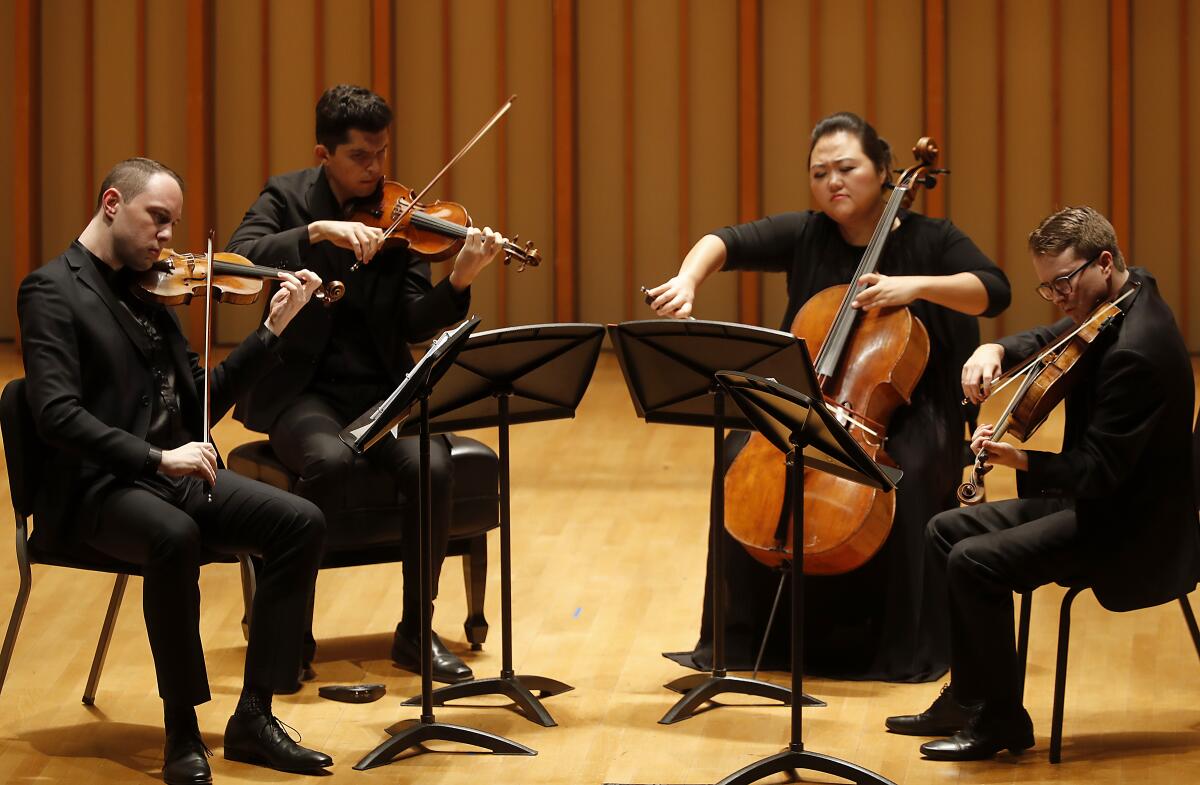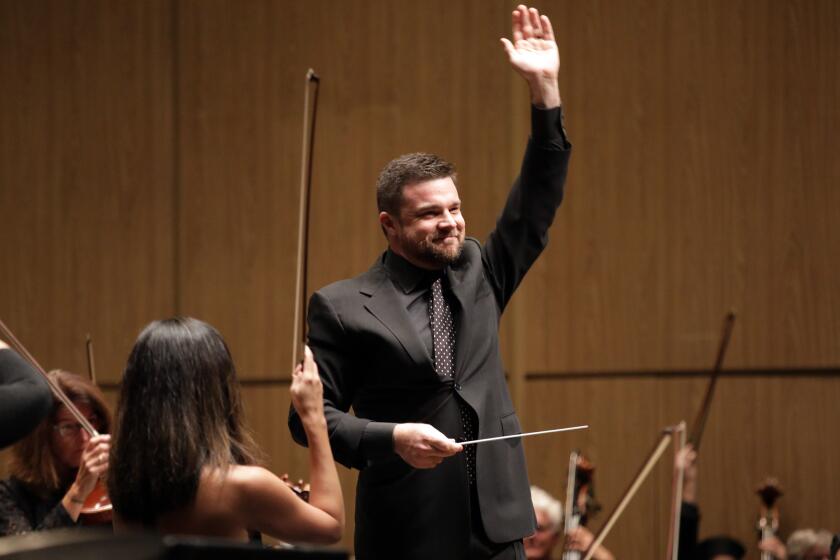Pianist Jonathan Biss and the Calidore quartet give Beethoven 250 a surprising launch

- Share via
The line of cars expecting to enter the underground parking of the Colburn School was long and stationary. A Beethoven concert was to begin in 10 minutes. It took another frustratingly full 25 minutes to creep up to the entrance only to be told in no uncertain terms, “No Beethoven parking.” No exceptions.
Many had already turned around and given up. Arguments broke out. No one in this day and age is allowed to say, “No Beethoven.”
Beethoven is a given. Beethoven is a right. Beethoven is accessed with incredible ease. A week doesn’t go by without new recordings of Beethoven that can be streamed instantly. More than that, Beethoven 250 has officially begun with the fall season. The great composer’s 250th birthday isn’t until Dec. 17, 2020, but, hey, he’s Beethoven. Rules and calendars don’t apply.
Navigating rush hour downtown traffic to find alternative parking, I’d missed the first quartet in Colburn’s “beethoven 250” (lowercase is cool), a cycle of string quartets featuring the Calidore String Quartet and student ensembles, and figured I might miss the second. I’d already spent well over an hour on the 10. And now “No Beethoven.”
I don’t imagine Colburn meant it this way, but the outsourced-parking law of unexpected consequences in this case proved a consequential early Beethoven birthday gift. Please don’t take that as a reflection on the Calidore. This quartet, formed by students at Colburn nine years ago and now taking the world by storm, is astonishing. Its performances of two of late Beethoven quartets Wednesday, some of the most utterly profound chamber music in existence, were shockingly deep. I’ve never heard a quartet so young get so inside this ultimately inscrutable music.
Still, for Beethoven to matter, nothing about the music, the playing of it, the listening to it, should be easy. Beethoven was a fighter. He was full of fury. He was probably an awful person. He could be insulting. By all accounts he smelled bad. He was deaf. His music shouted louder and angrier than any before it. He and it were equally impossible. Let’s please not go down the road about his relationship with his nephew. We have more than enough material from detailed and analytic biographies and studies for psychoanalyzing that. He’d never survive today’s merciless social media.
But there can be no heaven without a hell, and Beethoven’s demons gave him a direct line to the angels. The angels were there, inside Colburn’s Zipper Hall, and they demanded proof you really wanted in. The parking situation may not have even been about space. The hall was less than half full.
This was the second Beethoven concert in two days. Tuesday night Jonathan Biss played the first of two concert programs of Beethoven piano sonatas at the Soraya on the Cal State Northridge campus. The Colburn quartet cycle runs through Friday, with two concerts a day. Presumably a constant this season and next will be endless looks at every which way to play Beethoven. Biss and the Calidores offered an interesting introduction from an American perspective.
L.A. Chamber Orchestra continues its “Session” experiment with Christopher Rountree’s wild Up, the Four Larks theater troupe and a vibe that proves a welcoming departure.
Biss is a New Yorker who will turn 40 next year, three months and one day before Beethoven hits 250. He comes from a prominent musical family. He is a prodigy of one of the great American Beethovenian pianists, Leon Fleisher. He is known as a thinking pianist who has had a large number of people sign up for his online Beethoven sonata class. He has spent much of the past decade recording Beethoven’s 32 piano sonatas, and last month he began what will be an extensive tour of playing them around the world for the rest of this year and all of next.
The Soraya program didn’t go well, and I’m taking that as a good sign. Biss’ recordings demonstrate an easy, intelligent way with Beethoven, but no real risks taken and few insights.
In the program Tuesday — which began with the genial “Pastorale” Sonata, included the “Moonlight” and ended with two mysterious late sonatas, Opp. 90 and 101 — Biss took ungenial chances. At one extreme, he pounded, not afraid to make ugly sounds. At the other he fished for the ethereal. He had memory slips.
The concert was played before an intimate audience sitting on the stage behind the pianist and looking out into the empty hall. There was no place for him to hide. He had his fine moments, but he gave the impression of not being satisfied by them. With something like 50 Beethoven concerts ahead of him in the next many months, he has time on his side, and if treated, as here, fearlessly as an adventure full of dangers, what doesn’t kill him will make him matter.
The Beethoven string quartets at Colburn are divided between the Calidores, ad hoc student ensembles (each with a faculty member), and an early one played by the student Viano String Quartet, which is attracting attention. A dynamic Viano violinist, Hao Zhou, played in the middle quartet, Opus 59. No. 1, and he was striking. The Colburn, which also played an important role in the development of the Calder Quartet, looks to be an exceptional maker of string quartets.
Over the last few years, I’ve kept up with the Calidore, which now is based in New York, mainly through recordings and broadcasts, and frankly I wasn’t prepared for what the quartet brought to Beethoven’s 13th and 14th quartets, Opp. 130 and 131, the latter being for many of us the absolute pinnacle of Beethoven and the string quartet literature.
The essence of the Calidore is just how centered it is. It does not give the impression of risk-taking but risk-absorbing. The quartet’s cellist, Estelle Choi, anchors herself as though she has roots extending under the stage. Her tone is rich, deep and powerful, giving the impression that music and the room are a single living being. She is unflappable but not obvious. When Beethoven erupts, as he does in the Presto movement in the middle Opus 131, her cello mimics the absurdity of unexpected delight, the portents of a godlike laughter beyond our means of understanding.
Fast-rising Venezuelan conductor Rafael Payare takes over San Diego Symphony the same weekend Michael Christie begins at New West in Thousand Oaks.
The other members, violinists Jeffrey Myers and Ryan Meehan and violist Jeremy Berry, are fully cognizant of a Beethoven who is asking questions, not giving answers. Everything is an exploration, spiritual and sensual, certain and uncertain. In the captivating Cavatina of Op. 130, they made the phrases seem to rise and fall with wondrous questioning. Will she? Won’t she? In both quartets, the Calidore approached the kind of sublimity other quartets spend a lifetime seeking.
No Beethoven parking, indeed. The only way to get through Beethoven 250 is for Beethoven to remain a moving target. This is a better than expected start.
'beethoven 250'
Where: Zipper Hall, 200 S. Grand Ave., L.A.
When: 5 and 8 p.m. Thursday-Friday
Tickets: $15 and $30
Information: colburnschool.edu
More to Read
The biggest entertainment stories
Get our big stories about Hollywood, film, television, music, arts, culture and more right in your inbox as soon as they publish.
You may occasionally receive promotional content from the Los Angeles Times.












